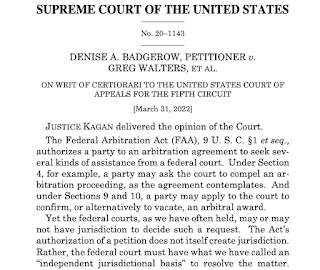Orlando Mediator Lawrence Kolin explores current issues in Alternative Dispute Resolution, including mediation and arbitration of complex cases by neutrals resulting in settlement of state and federal litigation and appeals. This blog covers a wide variety of topics-- local, national, and international-- and includes the latest on technology and Online Dispute Resolution affecting sophisticated lawyers and parties to lawsuits.
Friday, April 1, 2022
FAA Jurisdiction Case Decided by SCOTUS
The Supreme Court of the United States yesterday issued an important ruling on federal court jurisdiction in matters governed by the Federal Arbitration Act (FAA) saying it does not allow federal courts to “look through” to the dispute underlying an arbitration to establish jurisdiction to confirm or vacate an arbitration award. The FAA authorizes a party to an arbitration agreement to petition a federal court for various forms of relief. The Act’s authorization of such petitions does not itself create the subject matter jurisdiction necessary for a federal court to resolve them. Previously, in Vaden v. Discover Bank, the Court assessed whether there was a jurisdictional basis to decide an FAA Section 4 petition to compel arbitration by means of examining the parties’ underlying dispute. Specific language in Section 4 instructed a federal court to “look through” the petition to the “underlying substantive controversy.” If the dispute underlying a Section 4 petition falls within the court’s jurisdiction for example, by presenting a federal question, then the court may rule on the petition to compel arbitration. In this case, Badgerow v. Walters, the question presented was whether that “look-through” approach to jurisdiction applies to applications to confirm or vacate arbitral awards under Sections 9 and 10 of the FAA. The majority ruled Congress chose to respect the capacity of state courts to properly enforce arbitral awards. Justice Kagan writes "the look-through rule is a highly unusual one: It locates jurisdiction not in the action actually before the court, but in another controversy neither there nor ever meant to be." This application in an employment termination case should go to state, rather than federal, court raising claims between non-diverse parties involving state law. See opinion here-- https://bit.ly/3DyArhT
